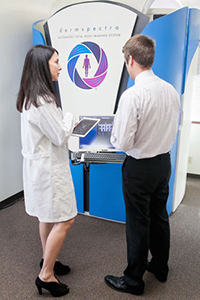When it comes to technology, Tucson’s DermSpectra believes in innovation. The skin is the body’s largest organ and DermSpectra works to make sure when changes happen, they’re noticed.
Karleen Seybold says the idea developed when she and co-founder Clara Curiel-Lewandrowski, MD, realized there was a “critical gap” in imaging technology.
 “Despite more than five million cases of skin cancer, there are very few tools available to aid in standardized screening,” Seybold said, adding that doctors notes and photos taken with inconsistent light and poses are not the best ways to track the changes to a person’s changing skin.
“Despite more than five million cases of skin cancer, there are very few tools available to aid in standardized screening,” Seybold said, adding that doctors notes and photos taken with inconsistent light and poses are not the best ways to track the changes to a person’s changing skin.
Not satisfied with the inconsistency in medical photography, Seybold and Curiel-Lewandrowski, developed the DermSpectra Automated Total Body Imaging System. The system has nine fixed cameras to properly illuminate and focus on patients’ skin. Seybold says the goal is to see medical records become more image-centric.
“We wanted to set a standard in resolution and lighting formats, so that time over time you could replicate these poses for tracking,” Seybold said. Gathering the images takes about 10 minutes, making the process both faster and more cost effective than individual medical photographers.
Taking it a few steps further, the system puts together a body scan of every patient, so physicians’ knowledge of each case is complete and the data is consistent. Seybold calls the method a “Google Maps” system that allows physicians to explore and focus on different parts of the body and leave notes for future reference.
DermaSpectra’s success can be largely attributed to the team behind the cameras. Seybold worked at Raytheon for 17 years before cofounding DermaSpectra. Recognized as one of Inside Tucson Business’ 2015 Women of Influence, she leads the technology development side of the business and holds patents for image sequencing, alignment and a skin cancer detection display module.
 Co-founder Curiel-Lewandrowski is DermaSpectra’s chief medical officer and a cancer expert. In addition to her work with the company, Curiel works as an associate professor of dermatology at the University of Arizona College of Medicine and as director of the Pigmented Lesion Clinic and Multidisciplinary Cutaneous Oncology Program, both part of the UA Cancer Center's Skin Cancer Institute.
Co-founder Curiel-Lewandrowski is DermaSpectra’s chief medical officer and a cancer expert. In addition to her work with the company, Curiel works as an associate professor of dermatology at the University of Arizona College of Medicine and as director of the Pigmented Lesion Clinic and Multidisciplinary Cutaneous Oncology Program, both part of the UA Cancer Center's Skin Cancer Institute.
DermSpectra screening is available at their Tucson office and the company is currently working to get their machines, built locally by CAID Industries, out to the rest of the county.
After that, well, DermSpectra is just excited about the possibilities the documentation will open up.
“In the future, there are lots of possibilities,” Seybold said.
Article used by permission of the Inside Tucson Business journal.
ALSO SEE:
"Positioning Arizona for Skin Cancer Breakthroughs" | UA Alumni Association


